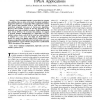Free Online Productivity Tools
i2Speak
i2Symbol
i2OCR
iTex2Img
iWeb2Print
iWeb2Shot
i2Type
iPdf2Split
iPdf2Merge
i2Bopomofo
i2Arabic
i2Style
i2Image
i2PDF
iLatex2Rtf
Sci2ools
118
click to vote
TC
2008
2008
Automatic Generation of Modular Multipliers for FPGA Applications
Since redundant number systems allow for constant time addition, they are often at the heart of modular multipliers designed for public key cryptography (PKC) applications. Indeed, PKC involves large operands (160 to 1024 bits) and several researchers proposed carry-save or borrow-save algorithms. However, these number systems do not take advantage of the dedicated carry logic available in modern Field-Programmable Gate Arrays (FPGAs). To overcome this problem, we suggest to perform modular multiplication in a high-radix carry-save number system, where a sum bit of the carry-save representation is replaced by a sum word. Two digits are then added by means of a small Carry-Ripple Adder (CRA). Furthermore, we propose an algorithm which selects the best high-radix carry-save representation for a given modulus, and generates a synthesizable VHDL description of the operator.
Constant Time Addition | Information Technology | Number System | Redundant Number Systems | TC 2008 |
Related Content
| Added | 15 Dec 2010 |
| Updated | 15 Dec 2010 |
| Type | Journal |
| Year | 2008 |
| Where | TC |
| Authors | Jean-Luc Beuchat, Jean-Michel Muller |
Comments (0)

